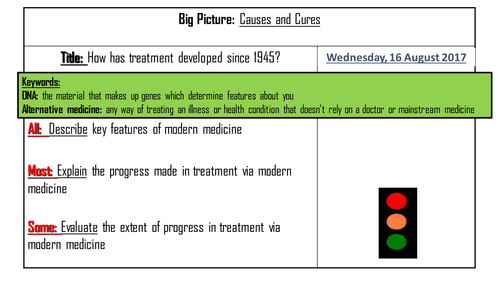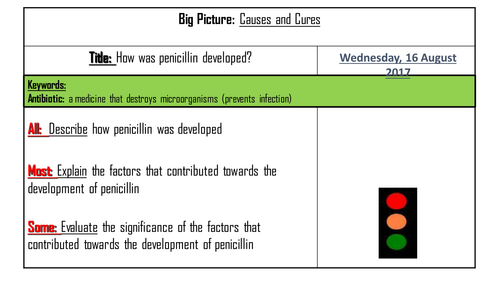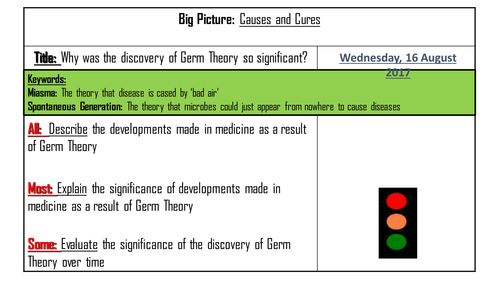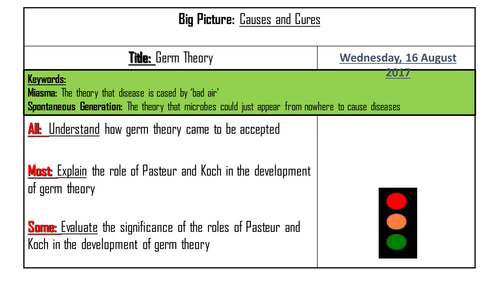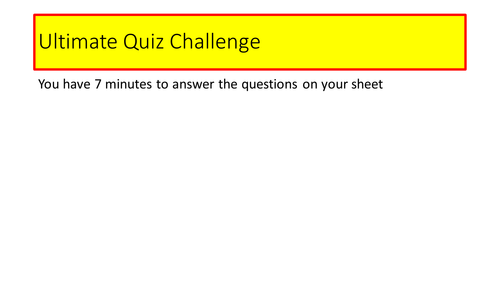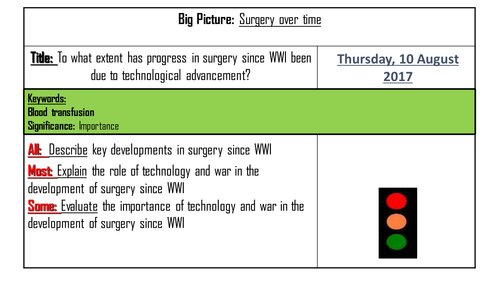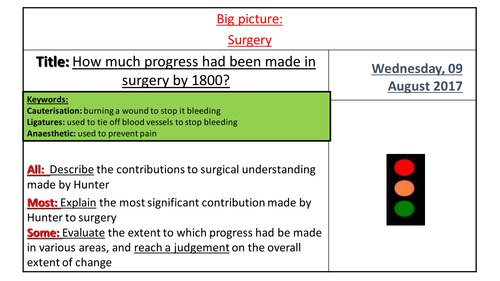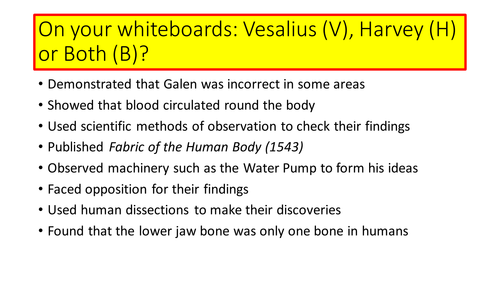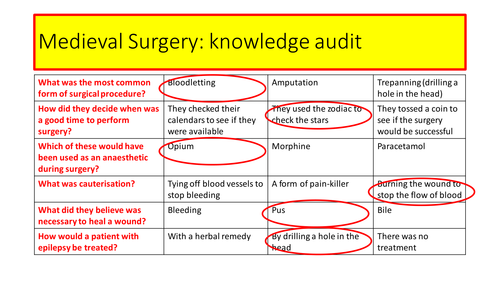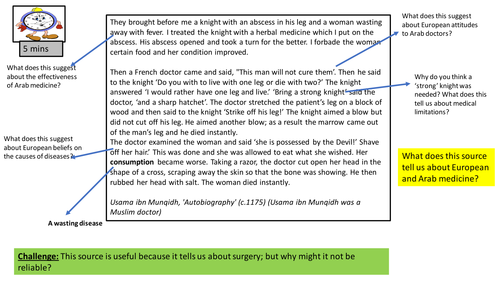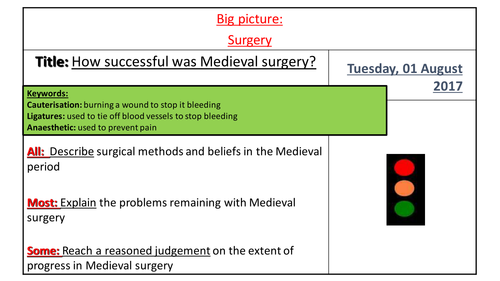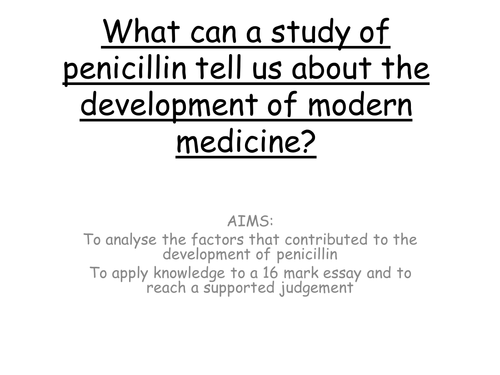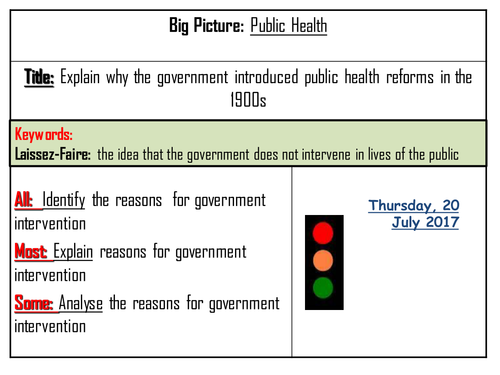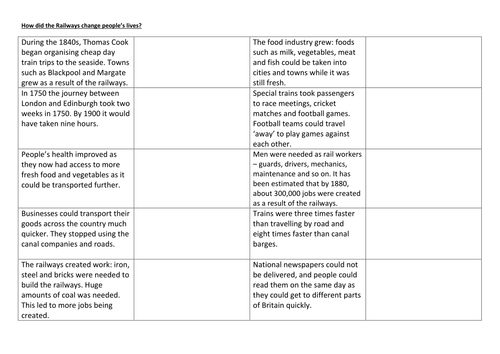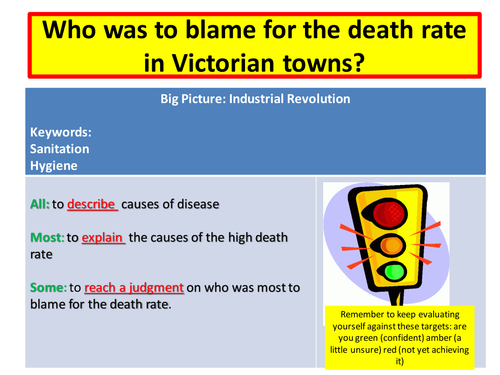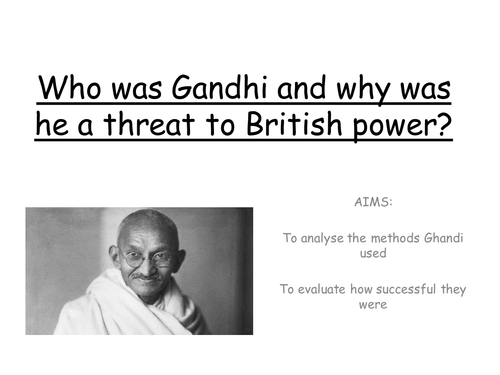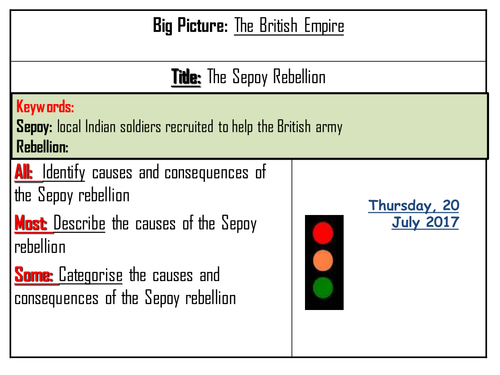
170Uploads
40k+Views
18k+Downloads
All resources

AQA 8145 Medicine - Modern Treatment
A GCSE lesson in which students examine several strands of development of modern medicine to consider the impact on treating diseases. Students will evaluate the extent to which these measures have led to progress in health and life expectancy before reviewing change in understanding causes and cures of diseases over time.

AQA 8145 Medicine - Development of Penicillin
A GCSE lesson in which students explain and evaluate the role of key factors in the discovery and subsequent development of penicillin before using their understanding to complete an 8 mark 'compare' exam style question.

AQA 8145 Medicine - Germ Theory and the development of Vaccines
A GCSE lesson in which students examine the subsequent development of vaccines after the development of germ theory. Students will explicitly consider the long term significance of the discovery of germ theory in preparation for an 8 mark exam style question. Includes differentiated resources for students to consider the role of key factors in the development of vaccines.

AQA 8145 Medicine - Germ Theory
A GCSE lesson in which students will understand the chronology of the discovery of germ theory and its journey to finally becoming accepted. Students will also consider the roles of Pasteur and Koch in this process and reach a judgement on which individual was more significant. Also encourages students to consider the role of specific factors in line with the requirements of the 16 mark essay question.
Bundle

AQA 8145 Medicine - Surgery: A Thematic Study over time
A series of lessons which covers the surgery sections of the AQA specification. This scheme has been designed for teaching thematically, but could be incorporated into chronological teaching. Includes practice and preparation for all types of exam questions for the AQA Medicine paper.

AQA 8145 Medicine - Surgery over time
This works best as a summary lesson on the theme of surgery within the Health and the People Unit. Students will categorise evidence leading to progress in surgery before preparing for a 16 mark essay question in line with the new specification.

AQA 8145 Medicine - Developments in surgery in the 20th century
A GCSE lesson in which students will examine developments in surgery after WWI. Students will consider the role of the factors of war and technology in these developments and will reach judgements on which factor was more significant in the latter part of the 20th century.

AQA 8145 Medicine - Surgery and John Hunter
A GCSE lesson in which students examine the impact of John Hunter in the field of surgery. Students will consider which area was Hunter's most significant contribution to surgery. Students will then consider how much surgery has changed between the medieval period and by 1800 in preparation for the 'compare' 8 mark questions on the exam.

AQA 8145 Medicine - Pare and Surgery
A differentiated GCSE lesson in which students will understand the contributions of Paré to surgical developments before completing an 8 mark 'how useful' GCSE style question. This includes differentiated worksheets to help all students meet the exam requirements.

AQA 8145 Medicine - Renaissance Anatomy: Vesalius and Harvey
A GCSE lesson in which students will understand how and why developments were made in anatomical understanding during the renaissance period. Students will consider the significance of the contributions made by Vesalius and by Harvey. They will also consider the factors which contributed to these developments in preparation for 16 mark questions.

AQA 8145 Medicine - Did Religion help or hinder Medieval medicine?
A GCSE lesson in which students will compare the impact of the religions of Islam and Christianity on the development of medicine in the medieval period. Students will compare the religions to find similarities and differences before reaching a series of judgements on significance. These directly link to questions 2 and 3 on the new AQA paper, and includes an 8 mark 'compare' practice question which could be set for homework.

AQA 8145 Medicine - Medieval Surgery
A GCSE lesson in which students will consider the progress and limitations of Medieval surgery. Students will consider how successful Medieval surgery would have been by comparing to necessary factors in modern day surgery in order to analyse the limitations.

AQA 8145 Medicine - Introduction of penicillin
A GCSE lesson in which students will gain an understanding of the development of penicillin from its first discovery to its mass production. Students will also categorise the reasons into key factors and reach a judgement on the most important factor in the development of penicillin.

AQA 8145 Medicine - Liberal Reforms
A GCSE lesson in which students will understand the reforms introduced by the Liberal government at the start of the 20th century, and understand why they were introduced. Students will also develop their understanding through making links between factors.

AQA 8145 Medicine - How successful were the Liberal reforms?
A GCSE lesson in which students use sources to evaluate the effectiveness of liberal reforms in the first part of the 20th century. Students will evaluate by looking at the successes and failures of the reforms. Also includes a practice GCSE 8 mark question asking 'how useful'? Should follow from a lesson introducing the Liberal Reforms.

Industrial Revolution - Railways
A KS3 lesson in which students examine in the impact of the introduction of railways. Students will categorise consequences into social, economic and political impacts.

Industrial Revolution: Victorian towns
A KS3 lesson in which students investigate why the death rate was so high in Victorian towns. Students will consider who is to blame by categorising factors which contributed to the death rate, and reaching a judgment about what could be done to solve the issue.

British Empire - Gandhi and Independence
A KS3 lesson in which students evaluate the methods used by Gandhi to protest against British rule. Students will reach a judgement about the most important reason why British rule was ended in India.

British Empire - Sepoy Rebellion
A KS3 lesson in which students will consider the causes, events and consequences of the Sepoy rebellion. Students will categorise the causes in to long and short term causes and the trigger.
Bundle

Civil Rights Movement - Protest in 1950s
A series of lessons in which students examine the significance of 3 key events during the 1950s. Students will use these to assess the extent to which life had improved by the end of the decade.

